5 Reasons Not to Start Solid Foods Before 6 Months of Age
In this episode we're talking about:
- Reasons why parents get pressured to start solid foods early…you've heard some of these before I'm sure
- The risks and consequences of starting solid foods too early…choking, food allergies, aversions…it's not pretty
- Observing your baby for their reliable signs of readiness to eat…spoiler alert: not all babies are ready right at 6 months

LISTEN TO THIS EPISODE
Episode Description
I know you’re getting pressure to start solid foods prior to 6 months of age. There’s actually no upside to starting early…and it can be dangerous. In this episode I’m outlining 5 primary reasons to delay the introduction of solid foods until your baby is really ready to safely begin self-feeding.
Links from this Episode
- Baby-Led Weaning with Katie Ferraro program with the 100 First Foods™ Daily Meal Plan, join here: https://babyledweaning.co/program
- Baby-Led Weaning for Beginners free online workshop with 100 First Foods™ list to all attendees, register here: https://babyledweaning.co/baby-led-weaning-for-beginners
Other episodes related to this topic:

Latest Episodes
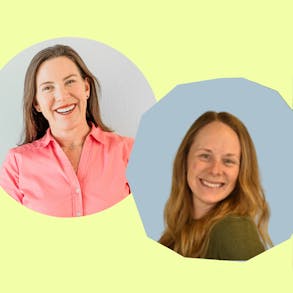
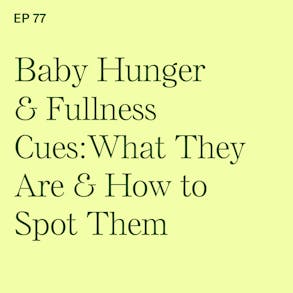
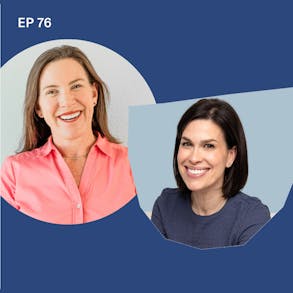
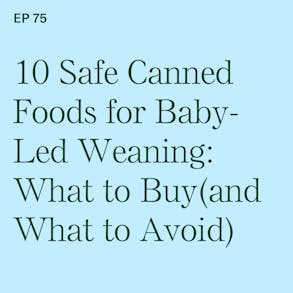
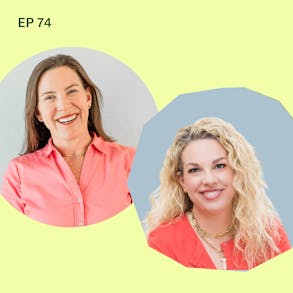
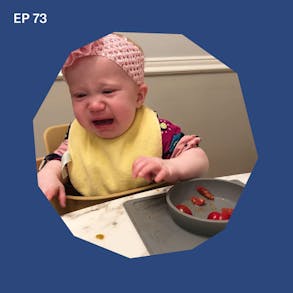
Katie Ferraro (0s):
Just got back from a Thanksgiving road trip. We drove to see my husband's family in Texas. So I have a totally empty refrigerator at home and five new foods that I need to prepare for my friend Carissa's baby Ezra. So I'm making Ezra's 100 First Foods. I'm following my own 100 First, Foods Daily Meal Plan. I've been working on revamping a lot of the recipes and kind of streamlining the grocery list. Oh my gosh, groceries are so expensive and I wanna bring the cost down of making these foods for your baby. We're on week 13 now. He's having foods number 61 to 65 and I'm looking through the daily recipes for this week and the weekly grocery list. And I'm really glad that they are pretty easy foods this week 'cause I feel like I need a break in the kitchen. So the five new foods that Ezra is having this week, just to update you in case you've been following along, he's having a new fruit every Monday.
Katie Ferraro (41s):
We're doing blueberries. So I've got this blueberry ricotta lemon pancake coming his way. We do a new vegetable on Tuesday, so that's peas. Have a pea fritter recipe that I just tweaked 'cause we don't offer small-sized pieces of foods like peas to early eaters. And even though Ezra is nine months now, he still doesn't have his grasp, which is fine. He's gonna love these fritters and be able to self-feed them. We do a new starchy food every Wednesday, so it's a little bit of a wacky whole grain. It's the whole grain kamut that we're having. But the kamut quiche recipe I made is so easy. Thursday, new protein food, we're doing chickpeas as we work our way through the second half of the protein list. It's all the plant proteins have a super easy homemade chickpea hummus recipe. It's way lower in salt than anything you can buy at the store. And then on Friday we do a new allergenic food of the week.
Katie Ferraro (1m 23s):
This is one of my favorite baby-led weaning foods. It's sardines. You guys sardines are like a super easy way to reintroduce your baby if you haven't already done it to the potentially allergenic food fin fish. So Ezra's had fish two other times already with multiple re-exposures from this program and now he's gonna have sardines if you want to follow the same 100 First Foods Daily Meal Plan that we're doing. It's all part of my Baby-Led Weaning with Katie Ferraro program. I've got the exact sequence of foods to feed plus my 100 First Foods content library. So you can see and learn and watch all the videos on how to prepare these foods safely 'cause I want your baby to eat a 100 foods before turning one. You can follow this exact meal plan, you can try all of the new foods and recipes too, when you sign up at babyledweaning.co/program.
Katie Ferraro (2m 4s):
Again, that's babyledweaning.co/program and I hope to see you there. There are so many things that I have held off on buying for the past few months and like I want this or I need this right now. No, I'm gonna hold off 'cause I know it's gonna go on big time Black Friday sale. So on my list of stuff to buy myself on Black Friday are more ezpz lids for my Mini mats and my Mini bowls. So I've been making all of my friend's baby Ezra his a 100 First Foods and then I deliver the five new foods and meals to their house each week for the baby. But I don't have enough lids to make up each of the weekly plates and I refuse to pay full price. So right now ezpz is having a 30% off sale. All of the feeding gear, including the ezpz lids, are 30% off with the affiliate discount code BLWHOLIDAY23.
Katie Ferraro (2m 49s):
And this sale runs now through November 27th. It's valid for us purchases only at ezpzfun.com. Again, that 30% off sale code BLWHOLIDAY if you want to stock up on feeding gear too, this is also a really good time. Like 30% off is the steepest ezpz discount you will ever see my regular code KATIE10 is only good for 10% off. So the bump to 30% is nice if you've got baby showers or new baby gifts that you gotta buy. I love the ezpz First Foods set. Or if your own baby is turning one or you have one-year-old parties to attend anytime in the new year. The Mini feeding set from ezpz at 30% off is a steal for the one-year-olds again, that ezpz affiliate discount code is BLWHOLIDAY23, 23, the number two three now through November 27th.
Katie Ferraro (3m 42s):
Happy feeding. And you hear all about these different, you know, reliable signs of readiness to eat. In my opinion as a Registered Dietitian specializing in baby-led weaning and infant feeding, the most important reliable sign of readiness to eat is your baby's ability to sit on their own relatively unassisted. That is the indicator they're showing you there, that they have the requisite- trunk strength and head and neck control- to facilitate a safe swallow of something that's not infant milk. And spoiler alert, that's not going to happen prior to six months of age. And also your baby might not be sitting on their own right at six months of age and that is perfectly fine as well. A lot of babies are six months plus one week or six months plus two weeks, sometimes even six months plus three weeks before they're able to sit on their own. And that's perfectly fine.
Katie Ferraro (4m 22s):
Wait until they're showing you that they're ready and safe to swallow anything except infant milk. Hey there. I'm Katie Ferraro, Registered Dietitian, college nutrition professor, and mom of seven specializing in baby-led weaning here on the Baby-Led Weaning Made Easy podcast. I help you strip out all of the noise and nonsense about feeding, leading you with the confidence and knowledge you need to give your baby a safe start to solid foods using baby-led weaning. Well hello and welcome back. In this episode, I wanna share five reasons not to start solid foods prior to six months of age. I get emails every day.
Katie Ferraro (5m 3s):
A lot of times these are questions coming off of my online webinar. So I teach a free video workshop called Baby-Led Weaning For Beginners. And at the end of it, there's a Q&A section and parents can type in questions. And then they come into me as an email and I respond to the email. And so many of them are like my baby's four months of age and my doctor told me to start solid foods or my mother-in-law's giving me grief saying that baby's hungry and needs to eat more food but he's only five months of age, or my baby's five and a half months of age, but not sitting on his own yet. And my doctor's saying I should start solid foods. And parents feel so much pressure to start solid foods early. So in kind of a short mini training episode like I do here every Monday, I want to share five reasons why you don't want to start solid foods prior to six months of age and stay till the end because I'm gonna be sharing with you the most dangerous thing that happens when we start solid foods early.
Katie Ferraro (5m 54s):
Again, not to scare you, but just to incentivize you to really wait until your baby is ready. So the first reason why we don't want to start solid foods prior to six months of age is that your baby is not developmentally ready. So infants are typically not developmentally ready for solid foods prior to six months of age. Sometimes we hear this from grandmas, let the baby be a baby. Okay? Your baby's body is still maturing, okay? Their motor skills, their ability to sit up, their ability to grasp objects, they're not sufficiently developed for safe and effective eating by six months of age. So from a developmental standpoint, we know, like think about your baby when they can't sit up on their own and they're slouched over, how can they possibly safely swallow soft, solid strips of avocado if they can't even sit upright on their own?
Katie Ferraro (6m 40s):
So from a physiological physical development standpoint, your baby is not yet ready. The second reason why we don't want to start solid foods prior to six months of age is because of the increased risk for food allergies. Okay? We know that early introduction of allergenic foods, we, we want you to introduce allergenic foods early and often, but there is data to show that very early introduction. Sometimes parents freak out, they're like, well, I gotta get these allergenic foods in as early as possible to help reduce the risk of food allergy. We actually have the opposite of the desired or intended effect, which is you can actually increase the risk of food allergies if you introduce them too early. And I'll share the references for each of these in the Shownotes for this episode, which you can find at BLWpodcast.com/387.
Katie Ferraro (7m 22s):
So when your baby is showing the reliable signs of readiness to eat and they're safe to swallow anything that's not infant milk, so breast milk or formula, then yes, hit the ground running. We do those allergenic foods. I do one new allergenic food each week as part of my Baby-Led Weaning with Katie Ferraro program. We start in week one. So by week nine, your baby has had all of the big nine allergenic foods. Those are the nine foods that account for about 90% of food allergy. Now there is a caveat here for a very, very small subset of the population for the babies who are identified as being at high risk for peanut allergy. Those babies may benefit from introduction of peanut protein a little before six months of age. But this only applies to you if your baby is in that high risk category.
Katie Ferraro (8m 4s):
And the current guidelines say that babies are at high risk for peanut allergy if they already have an egg allergy and or severe eczema. So I'm not talking about the run of the mill eczema that all babies have. We're talking about severe eczema diagnosed by a pediatric dermatologist or allergist. You know, if this is your baby, you need to be talking specifically to your pediatric allergist, not just your pediatrician. You need a referral to a pediatric allergist who will guide the introduction of at least peanut protein, which may occur prior to six months of age. For the rest of you, the other 99% of the babies out there, or parents of the babies listening, wait until six months of age. There's no data that shows that starting the allergenic foods prior to six months of age is any more protective than if you wait till six months of age.
Katie Ferraro (8m 46s):
And from a safety standpoint, we know your baby is not safe to eat anything except infant milk prior to that age. The third reason why we don't want to start solid foods prior to six months of age has to do with nutrient needs. So as a Registered Dietitian, I'm very interested in helping parents understand that breast milk and or formula, so infant milk, is sufficient to meet your baby's needs for the first six months of life, or six months adjusted age if your baby was born prematurely. If we introduce solid foods too early, we displace the nutritionally complete liquid of breast milk or formula, which could potentially lead to nutrient imbalances. And so if you look at the World Health Organization, the American Academy of Family Physicians, the American Academy of Pediatrics, they all recommend exclusive breastfeeding for the first six months of life.
Katie Ferraro (9m 34s):
That's because breast milk is sufficient to meet your baby's needs. When your doctor comes in and chimes in at four months of age, oh, start white rice cereal at four months of age. To me that is a anti breastfeeding message. You are confusing parents. You are telling them that the breast milk or the formula is not sufficient and that is not true. Starting solid foods too early displaces the important nutrition from breast milk. There's absolutely no reason to start solid foods early. There are only potential drawbacks. So that's the third one from a nutrition standpoint. Hey, we're gonna take a quick break, but I'll be right back.
Katie Ferraro (10m 43s):
The fourth reason not to start solid foods prior to six months of age is because of the increased risk of choking. Okay? Your baby who is not six months of age, who cannot sit up independently on their own, they are not demonstrating the sufficient core strength and head and neck control required to safely swallow solid foods. Just because you can shove a spoon of pure food down the throat of a four month old certainly does not mean that you should. Putting anything in a baby's mouth, including a spoon, can be a choking hazard. It is imperative to wait until your baby can sit up and they're showing that reliable signs of readiness to eat. Okay? Being able to sit relatively independently, to me as a Registered Dietitian specializing in infant feeding and baby-led weaning, that is the most important sign of readiness to eat after your baby being six months of age.
Katie Ferraro (11m 31s):
We don't even consider solid foods until six months or the six month adjusted age if your baby was born prematurely. And then we want to make sure that your baby is also able to sit on their own. And those two things will not happen until the six month mark. And for a lot of babies, spoiler alert, your baby's not gonna be sitting right at six months of age. It will be six months plus one week or six months plus two weeks, six months plus three weeks. Sometimes babies will even go till seven months of age. That's unusual, okay? But it's not indicative of something like horribly wrong. I just was working with a good friend's baby. Our friend who helped us launch our YouTube channel. She had her third baby, she wants to do baby-led weaning, baby was seven months plus two days before she was sitting on her own. She's now eight months of age. She's cruising along trying new foods. But the mom is so grateful that she didn't start solid foods early.
Katie Ferraro (12m 11s):
She said, this is already so stressful. I can't imagine how stressed I would be if we were trying to do this when she wasn't even sitting up on her own. So the increased risk of choking is the fourth reason not to start solid foods before six months of age. Now, the fifth reason not to start solid foods prior to six months of age relates to a topic that I don't talk about very much, but is the link between overfeeding and unwanted weight gain. Okay? Early introduction of solid foods may lead to overfeeding because since we know the baby can't successfully feed themselves prior to six months of age 'cause they don't have again the physiological ability to sit up on their own, they don't have the motor skill set to pick the foods up and bring them to their mouth. The assumption there is that an adult is feeding the baby.
Katie Ferraro (12m 52s):
And if adult is feeding the baby, the adult is the one driving the eating experience. The adult is the one deciding how much, how fast, how often the food should go down the baby's throat. That is not baby-led weaning. That is conventional adult-led spoon feeding. And we know that that very quickly overrides the baby's ability to learn how to recognize and respond to their internal hunger and fullness cues. Okay, we talk so much. I do a lot of work with the WIC program and a lot of education and breastfeeding is all about responsive feeding, responsive breastfeeding, responsive bottle feeding, looking for and honoring the baby's hunger and fullness cues. What do babies do when they're hungry? They cry. What do Babies do when they're full? They turn their head away from the breast or the bottle. Why then at six months of age, do we rip away the baby's autonomy and their ability to do that and start arbitrarily force feeding them amounts of pureed foods that we decided was correct for them?
Katie Ferraro (13m 44s):
Okay, with the baby-led approach, it's just an extension of the responsive feeding methods that I hope you're employing in the first six months of life. Look for your babies signs of hunger. Give them lots of opportunity to learn how to eat 'cause early on in the weaning period, they do not know how to use food to make that feeling of hunger go away. Let them experience that food. That's why we let the babies sit in the high chair one to two times a day for up to 20 minutes a day starting at six months of age. I know they're not going to eat very much. They're getting most of their nutrition from infant milk, but they're never going to learn how to feed themselves if we don't give them ample space and opportunity to practice feeding themselves. And if the alternative is, oh, I'm stressing out. They're not getting enough, so I'm gonna shove this food down their throat. Well, all you're doing is conditioning that baby to override their internal hunger and fullness cues, which down the road can lead to overeating and unwanted weight gain.
Katie Ferraro (14m 31s):
So it's not something pleasant to think about, but know that all of these things are intertwined. We want to wait until six months of age 'cause from a nutrition standpoint, your baby doesn't need anything except breast milk or formula. Until then, from a physiological or physical development standpoint, your baby cannot sit up on their own yet. They cannot support a safe swallow if they are not demonstrating the appropriate trunk strength and head and neck control. There's increased risk of choking, there's increased risk of food allergies, and they're not developmentally ready. So if you needed any inspiration to wait until six months or be on to start solid foods, I hope that helps you out. A link to references that I use to put together this list in the Shownotes for this episode, which you can find bwpodcast.com/387.
Katie Ferraro (15m 15s):
Thank you to our partners at AirWave Media. If you guys like podcasts, the Future Food and Science, and using your brain, check out some of the podcasts from AirWave or online at BLWpodcast.com. Thank you so much for listening and I'll see you next time. If you're interested in doing baby-led weaning, but you're not exactly sure, like what does that mean? What does it look like? Where do I start? My online program called Baby-Led Weaning with Katie Ferraro has everything you need to give your baby a safe start to solid foods and get them to eat over 100 foods before they turn one, whether you're terrified of choking or maybe you've started but you feel like you're feeding your baby the same foods over and over 'cause you don't know what to feed next, or you're looking for guidance on how to prepare foods safely for your baby's age and stage.
Katie Ferraro (16m 5s):
My program has exactly what you need. There's five hours of concise self-paced video training. You can knock this thing out during nap time this week. You also get access to my 100 First Foods content library so you can see and learn exactly how to prep all of the 100 Foods as well as my original 100 Days Meal Plan. I've been refining this program for the last seven years. Just today, a mom wrote to me and told me that the 100 Days Meal Plan has been a quote game changer for her busy lifestyle. When you join the program, you also get access to over 100 phase two combination food recipes. So you're gonna try out the trickier textures, push your baby's palate. And what's cool about these recipes is your whole family will enjoy them. So everything you need to give your baby a safe start to solid foods is inside of the program.
Katie Ferraro (16m 45s):
It's created by me, a Registered Dietitian who specializes in infant feeding. If you're tired of hunting and pecking around the internet trying to piece this stuff together on your own, I put it all in one convenient place for you. I invite you to check out the Baby-Led Weaning with Katie Ferraro program that's at babyledweaning.co again, that website is babyledweaning.co and click on program to learn more.

The Program Baby-Led Weaning with Katie Ferraro
A step-by-step digital program for starting solid foods safely and navigating the original 100 FIRST FOODS™ meal plan with baby-led weaning.
 EXPERT-LED, PROVEN APPROACH TO EATING REAL FOOD
EXPERT-LED, PROVEN APPROACH TO EATING REAL FOOD CONCISE VIDEO TRAININGS TO MASTER BABY-LED WEANING
CONCISE VIDEO TRAININGS TO MASTER BABY-LED WEANING 100 FIRST FOODS DAILY MEAL PLAN WITH FOOD PREP VIDEOS
100 FIRST FOODS DAILY MEAL PLAN WITH FOOD PREP VIDEOS
Baby-Led Weaning for Beginners Free Workshop
Is your baby ready to start solid foods, but you’re not sure where to start? Get ready to give your baby a solid foundation to a lifetime of loving real food…even if you’re feeling overwhelmed or confused about this next stage of infant feeding.
Get baby-led weaning recipes and tips delivered to your email inbox.

